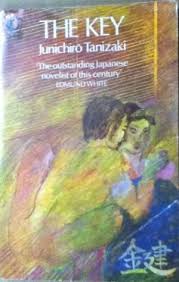
From Adrian Mole to Zamyatin’s ‘We’, from ‘The Yellow Wallpaper’ to Bridget Jones, very few things beat a good diary entry novel. And if a single diary wasn’t powerful enough, the run-away success of Flynn’s ‘Gone Girl’ shows how much fun it is to explore the potential twists and turns when a second voice is added to the mix. In Tanizaki’s ‘The Key’ we begin with a middle aged man’s provocative New Year’s entry:
This Year I intend to begin writing freely about a topic which, in the past, I have hesitated even to mention here. I have always avoided commenting on my sexual relations with Ikuko, for fear that she might surreptitiously read my diary and be offended. I dare say she knows exactly where to find it. But I have decided not to worry about that anymore.
The next chapter in the book is dated the fourth of January. In it, Ikuko records in her own journal how she came across the key to her husband’s diary when cleaning his room. The discovery is treated with suspicion:
Why should he have dropped the key in a place like that? Has he changed his mind and decided he wants me to read it? Perhaps he realises I’d refuse if he asked me to, so he’s telling me: ‘You can read it in private – here’s the key.’ Does that mean he thinks I haven’t found it? No, isn’t he saying rather: From now on I acknowledge that you’re reading it, but I’ll keep on pretending you’re not?’
Well, never mind. Whatever he thinks, I shall never read it.
Later on, her own diary will be discovered under similarly ambiguous circumstances. Anyone who’s read ‘Gone Girl’ recently will be familiar with the thrill of unpicking the same story through the different perceptions of its two protagonists. In ‘The Key’ however, the suspense created is far more claustrophobic and the power relations considerably more complex. We know both our narrators are devious and manipulative, sexual and naive. Their interactions with the other two characters in the tightly woven drama (the daughter and her potential suitor) show them to also be selfish and even cruel. The ideas of sacrifice and morality are cooly explored, along with more traditional shared-diary themes of voyeurism and truth.
I’m worried about spoilers so I don’t want to say too much about the plot (I found it chilling, unexpected and extremely satisfying). As for the writing style, my edition was translated by Howard Hibbett, whom I have previously praised for his excellent translation of Tanizaki’s Quicksand. Given the strict economy of this 160 page novel, the writing has to both subtle and simple for the story and characters to work; I can’t imaging any other translation succeeding quite so well.
‘The Key’ disturbed me and enthralled me. Just re-reading and typing out the quotations in this post felt like standing on the edge of an abyss, about to fall back into the mess of illusion, understanding, secrecy and exposure that make up the central marriage. Highly recommended as an introduction to one of the greatest Japanese writers of the last century, or as a reminder of his versatility and talent if you’re already a Tanizaki fan.



I’ve not heard of this book before but your review has made me really want to read it. I’m going to add it to my list now. Thank you for sharing such a great review. 🙂
Every time I get to read a new Tanizaki I get very enthusiastic! Looking forward to hearing what you think of this one 🙂
I have a few of Tanizaki’s books on my wishlist (Naomi, The Makioka sisters, In Praise of Shadows…) but I hadn’t heard of The Key either. Your review actually made me want to start with this one !
The books you name have been added to my own wishlist. I’m happy to swap my recommendation for the three new titles you’ve given me!